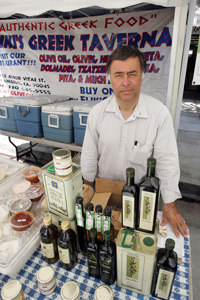Vendors at farmers’ markets have long complained that Los Angeles County public health department inspectors routinely spend less than 10 minutes in their booths twice a year, yet charge for nearly two hours worth of inspection time, thereby inflating inspection fees by at least a factor of four.
“It’s a corrupt system all aimed at generating extra money for the county,” said Panagiotis Theodoropoulos, the owner of Aliki’s Greek Taverna in Westchester who also runs Aliki’s Olive Oil booths at several local farmers markets.
After inquiries from the Business Journal, county health officials last week acknowledged that the fees have been out of line. They are now proposing to cut the health inspection fees for farmers’ market vendors by 30 percent.
“It’s fair to say that we received input and made another look,” said Angelo Bellomo, director of environmental health with the county’s public health department.
The proposed reductions will be folded into an entire inspection fee overhaul. A new fee schedule that called for generally higher fees was set to take effect on July 1. However, the new schedule has been pushed back at least a couple of months after the County Board of Supervisors heard complaints about fee hikes, particularly from restaurants, as reported in the May 16th edition of the Business Journal.
But the news that the farmers’ market vendors may get a break didn’t do much to soothe Theodoropoulos.
It was “a step in the right direction,” he said. However, he still doesn’t believe the fees are legitimate.
“I steal $10 from you and then I tell you I’m only going to steal $4 from you,” he said. “It’s still stealing and it’s wrong.”
Simmering conflict
Many vendors have long harbored hard feelings over inspection fees. The problem has intensified as farmers’ markets have grown in popularity and vendors like Theodoropoulos expand to additional farmers’ markets.
Five years ago, the county charged nearly $1,000 a year for health inspections for individual farmers’ market vendors that cooked on the premises and $660 per year for vendors selling prepackaged foods. So a vendor with stands at five local farmers’ markets that cooked food at the markets faced nearly $5,000 in annual health inspection fees.
“The fees were way out of line,” said Jim Bell, executive in charge of the farmers’ market division of Schreiner’s Fine Sausage Inc. in Glendale, which has booths at farmers’ markets in Redondo Beach, Manhattan Beach, Encino and Santa Clarita. “We were being charged $166 per quarter for an inspector to show up at our booth for five minutes twice a year, take a couple of temperature readings, eye our displays and jot a few notes down.”
In late 2008, after complaints from vendors, county public health officials reduced the fees to the current levels: $232 a year for stalls with prepackaged foods and about $600 a year for stalls where food is cooked on-site. They also added a $39 fee for booths that sell prepackaged foods and also offer samples to customers.
Assuming a 30-percent cut, that means the fee would be $162 for the stalls with prepackaged food and $420 for those that cook food.
“They still claim they spend nearly an hour per booth,” said Marcus Salvemini, owner of Salvemini’s Italian Kitchen in Sherman Oaks, who sells precooked pies at booths at five local farmers’ markets. “They don’t spend any more than 10 or 15 minutes at any of my booths and the fee for handing out samples is completely bogus.”
Another vendor with booths at farmers’ markets in Los Angeles, Orange and San Diego counties said that the current fees in L.A. County are roughly four times higher than in the other two counties for the same amount of inspections.
“I have no problem with reasonable fee levels,” said Sam Lewis, son of the owner of Fullerton-based Dry Dock Fish Co. “But I don’t understand how you can do the same number and level of inspections in Orange and San Diego counties and yet be charged four times as much in L.A. Something just doesn’t make sense there.”
But the vendors say that while the current and proposed fees are lower, they are still out of line and should be reduced much further.
Bellomo said the fees include travel time to the location and paperwork processing both before and after the inspection. But last week he acknowledged that inspectors don’t spend nearly as much time as the public health department initially believed for travel and paperwork associated with individual farmers’ market vendors.
Drive time
He said the main factor was re-examining the drive time, which had been 15 minutes for each vendor. “We realized that if you’ve got several vendors in one farmers’ market location, it doesn’t take that long to go from vendor to vendor, so we reduced the time to five minutes,” he said.
With some reductions in paperwork time also now being factored in, county public health officials last week came up with a new fee list for farmers’ market vendors, resulting in the 30-percent reduction.
Bellomo and other county public health officials will present the new fee list to the farmers’ market vendors in the coming weeks.
Bellomo said the main focus now is on making sure that the fees the county charges are in line with the actual inspection costs.
“Up until now, we’ve never sat down and looked at how much it actually costs to do these inspections,” he said. “That’s why you’re seeing these major adjustments in fees now, both up and down.”

